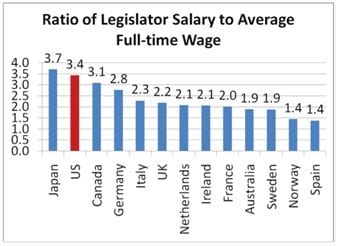
Are Taxpayers Getting Their Money’s Worth? New Report Exposes the True Cost of Congressional Compensation
David Williams
July 27, 2011
If the debate leading up to the debt ceiling deadline has told taxpayers anything, it is that Congress likes to wait until the last minute to do anything and they act like martyrs when they cancel part of their summer vacation. The American public is not being fooled. In a national Rasmussen Reports telephone survey, only 8 percent of likely U.S. voters think Congress is doing a good or excellent job. Fifty-two percent rate Congress’ performance as poor. To make matters worse, the same group of elected officials who have trouble coming to a consensus to save the country from economic Armageddon make a healthy living at taxpayers’ expense. A new report by the Taxpayers Protection Alliance and Our Generation details the generous compensation for members of Congress, who receive a salary of $174,000 per year, as well as generous fringe benefits that boost their total compensation to $285,000 per year (read full report here).
It is also disturbing to hear of the generous pay and benefits Congress has provided for itself in a time when unemployment rates are unacceptably high and those who work in virtually all industries in the private sector have seen their wages flatten out, or even cut. Those who were able to keep their jobs are constantly evaluated by “pay for performance” standards. It is clear that these performance standards are not applied to Congress, because the country is saddled with a $14.3 trillion debt and a $1.5 trillion deficit.
Members of Congress are among the highest-paid 5 percent of American workers. Unlike the private sector, where salaries are earned from willing customers, Congressional salaries and benefits are taken out of taxpayer’s pockets.
Another way to measure congressional salaries is to compare them with the average wages earned by private-sector employees. According to the Organization for Economic Cooperation and Development (OECD), an average full-time employee in the United States earns annual pay of $50,875. Members of Congress receive salaries of $174,000. This means that Members of Congress make 3.4 times more than the average full-time American worker. In addition, on average, legislators in other parts of the developed world receive salaries equal to 2.3 times the average wage of a full-time worker. By these standards, Members of Congress are among the highest-paid legislators in the world. 

Finally, the relative disproportionality of congressional pay does not disappear if one compares congressional pay with the pay of more educated private-sector employees. According to the Bureau of Labor Statistics, private-sector workers holding masters degrees earned 63 percent more than the average full-time American worker, or about $83,000. Even by this standard, Congressional salaries are more than double those paid to well-educated private-sector workers.
Most taxpayers think that Members of Congress should be adequately compensated for their efforts. However, it is excessive when the salaries and benefits paid to members of Congress make them among the best compensated employees in the American workforce. During a weak economic recovery, when unemployment is high and many Americans have had to make do with less, Congress should be sensitive regarding the salaries and benefits it provides to itself. Given record budget deficits, debt, and Congress’ seeming inability to agree on plans to address the shortfall, many Americans are skeptical of what they receive in return for what they are paying. Immediate steps need to be taken to cut Congressional salaries and benefits. For example, a salary cut of $74,000 (which would bring their salary to $100,000) would save taxpayers $39 million per year and reassure Americans that sacrifices made during this economic downturn are being shared by everybody, especially Members of Congress.
